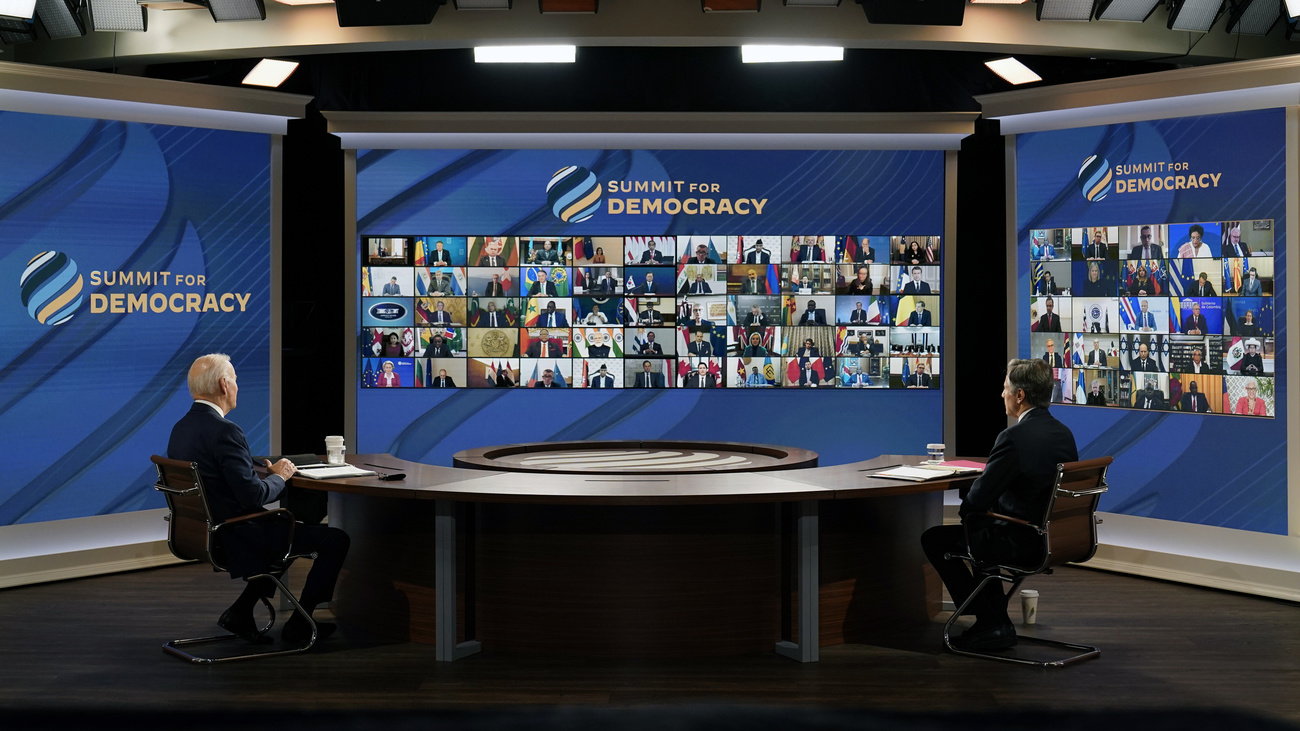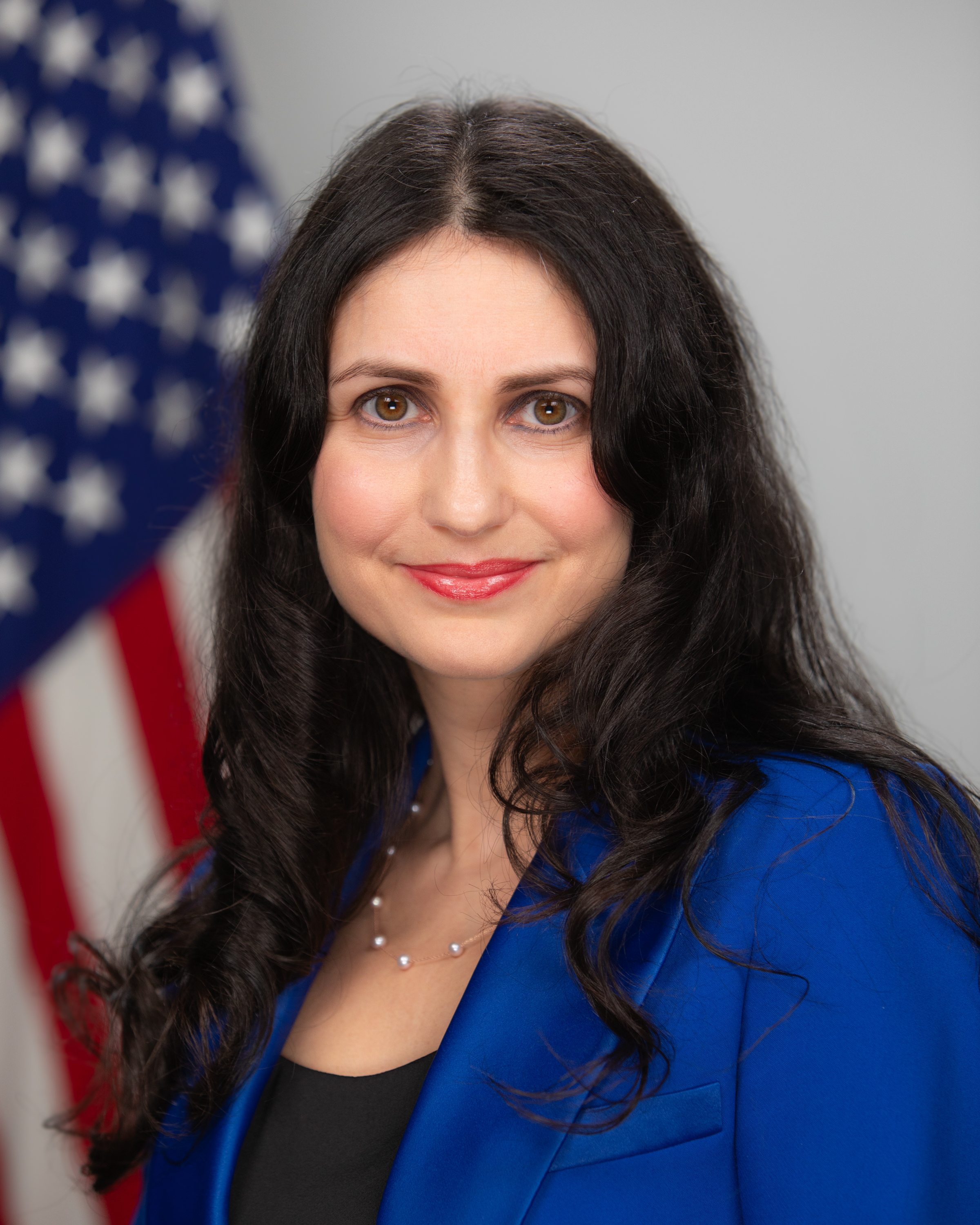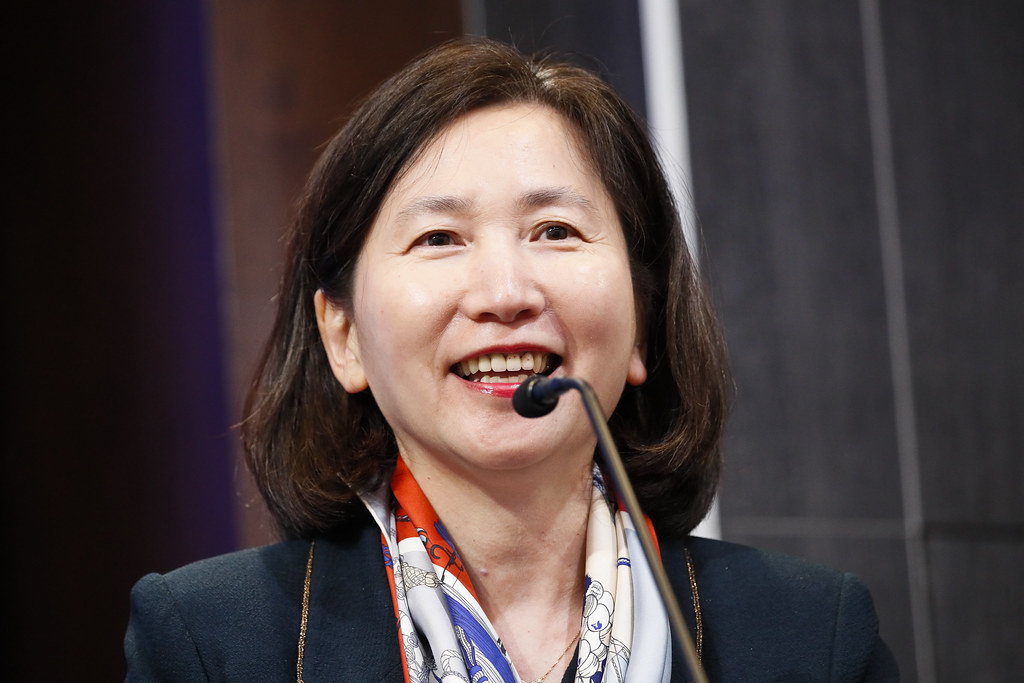
Is it all over for the World Summit for Democracy?

The inaugural World Summit for Democracy in 2021 provided US President Joe Biden with a prestigious foreign policy opportunity. Now the ambitious project is threatening to collapse. For Switzerland and its own new democratic foreign policy, this creates a chance.
All signs pointed to a new beginning in December 2021. In the hallways and rooms of the White House, the First Lady had just turned on the lavish Christmas tree lights. In a West Wing meeting room, her husband, US President Joe Biden, was seated comfortably in front of a huge screen. “Welcome to the first Summit for Democracy,” he began, addressing over 100 counterparts from around the world, who were unable to travel personally to Washington owing to the Covid pandemic.
A year after his election and the subsequent failed attack on the US congress, which his predecessor had incited, Biden exuded confidence. “In the face of ongoing and alarming challenges to democracy and universal human rights around the world, democracy needs champions,” he said. He went on to declare the summitExternal link the starting point for the fight for a freer world.
Our article on Switzerland’s participation in the first Democracy Summit 2021:

More
What Switzerland can offer the Summit for Democracy
Today, just two-and-a-half years after the first summit, little remains of that initial confidence, and not just because of the increasing autocratic tendencies in many regions of the world.
The commitment initially touted by the US has clearly faded. This is evident by the fact that the upcoming third summit will be held in South Korea’s capital, Seoul – and the Americans will be barely present.
How did it come to this?
‘Democracy First’, a divisive approach
From the outset, dark clouds hung over Biden’s initiative. The White House invited not only established and solid democracies such as Switzerland, Uruguay, Canada and South Korea to take part in this global endeavour, but also autocracies favourable to the US, such as Bangladesh, Pakistan and Congo.
According to Stephen Wertheim, Senior Fellow at the Carnegie Institute in Washington, Biden is making the same mistake as former president George W. Bush. “He linked his own values with military instruments and thought that he was uniting his polarised country by defending distant democracies,” said Wertheim, who claims the opposite is true. “The ‘democracy first’ approach is polarising the US even more.”
Few Americans consider it important and right to promote “democracy abroad”, as a study by the respected non-partisan thinktank Pew Research Center indicates. For example, over 75% of US citizens surveyed cited “protecting American jobs” as an important priority in foreign policy, but only just 20% cited “promoting democracy abroad”.
The first Summit for Democracy took place in Washington, DC on December 8-10, 2021, at the invitation of President Joe Biden. During this meeting, 100 heads of state declared their intention to promote democracy at home and internationally.
The second summit, in 2023, was held in a decentralised format in the US, Costa Rica, the Netherlands, Zambia and South Korea. The third is scheduled for March 18-20, 2024, in Seoul, South Korea. The programme includes a ministerial meeting on “Artificial Intelligence and Democracy”, a civil society forum and summits of heads of state and government.
The planning and execution of the 4th Summit for Democracy remains open.
As the American historian Stephen Wertheim wrote in his essay in The Atlantic magazine, the “democracy first” approach can be counter-productive to conflict situations and even worsen them.
For example, in Ukraine: “Biden’s own ‘defend democracy’ rhetoric has boxed him in. If democracy is the central value at stake, the notion of pressuring Ukraine’s elected leaders sounds illegitimate, even if Kyiv should adopt more achievable goals or explore negotiations with Russia.”
Wertheim goes on to say that Russian president Vladimir Putin invaded Ukraine primarily because it had drifted closer to the institutions of the West in response to Russia’s actions. Such aggression is illegal and unacceptable, regardless of whether one party is an autocracy and the other a democracy, Wertheim said. He sees similar challenges in the US’s attitude to Israel’s war against Hamas in Gaza or Taiwan’s position towards China.

Kelly Razzouk is President Biden’s World Summit for Democracy adviser. In the National Security Council she is responsible for all enquiries on democracy and human rights. She tells SWI swissinfo.ch that the Summit for Democracy has become a “catalyst and platform for government representatives, civil society and the private sector to work together to address the challenges and opportunities facing democracies today”.
But it is because of this and the forthcoming general election in South Korea on April 10 that the government is very cautious about hosting the upcoming meeting, says Sook Jong Lee, Senior Fellow at the East Asia Institute, an independent thinktank based in the South Korean capital.
The sociologist is co-coordinator of the third Summit for Democracy with several international organisations for the participation of NGOs and youth associations at the event.
Seoul has refrained from providing the necessary resources and infrastructure. No translation services have been provided and there are hardly any meeting rooms with technology that would enable hybrid meetings. The most serious issue, however, is the South Korean government’s refusal to invite participants of the civil society summit to meet government representatives*.
End of the summit?

“The initial energy and dynamism of the Summit for Democracy has evaporated. We don’t know how it will continue after this third summit, as many countries have become rather lukewarm,” Sook Jong Lee admits.
“It would be nice if a country like Switzerland, with its long and interesting democratic experience, could take on a greater leadership role in this process.”
In Bern, Simon Geissbühler from the foreign ministry is cautiously positive about this signal from South Korea. At the foreign ministry Geissbühler is the ambassador responsible for democratic foreign policy.
“In the future we want to strengthen the political dialogue on democracy and do more multilaterally. A summit could be an interesting platform to benefit our foreign policy goals,” he said. He added, however, that such mega-events would only make sense if they were results- and goal-orientated. In other words, if they produced concrete results.

More
Sister republics: what the US and Switzerland have in common
According to Geissbühler, Switzerland has largely fulfilled its commitments to the Summit for Democracy. “With the formation of a Swiss national human rights institution, we have achieved an important aim. In the area of digital democracy, we support the use of digital platforms, for example with the introduction of the voting assistance application ‘Smartvote’ in a number of pilot countries.”
Switzerland has also “made a significant contribution to the International Fund for Public Interest Media, supporting emerging democracies by promoting independent media”, he says.
More active Swiss role?
The conditions for Switzerland to play an even more active role in global democracy promotion are favourable. The Federal Constitution of 2000 contains a corresponding popular mandate “to promote respect for human rights and democracy” (Art. 54.4). Recently, the government also adopted Switzerland’s new foreign policy strategy for 2024-2027, in which a proactive “democratic foreign policy” is described as a “new accent”.
In contrast to the US government, the Swiss government can count on broad support from the population. In a representative survey in 2021, 80% of respondents stated that Switzerland was predestined to promote democracy worldwide due to its democratic tradition.
According Simon Geissbühler, Switzerland will be represented at the upcoming World Summit for Democracy in Seoul “with a small but broad-based delegation under my leadership. In addition, President Viola Amherd will contribute a video statement to the summit”.
It remains to be seen if Amherd will be able to help her fellow counterpart in the White House out of the jam he’s in.
*UPDATE 13/03/24: The South Korean government has said that more than 100 participants from the NGO Summit will be invited to attend the ministerial meetings on the first day and that government leaders will be present at the civil society event on the second day of the summit. The US government has said that it will be represented at the summit with a delegation led by US Secretary of State Antony Blinken.
Edited by Mark Livingston. Adapted from German by Sue Brönnimann
Do you want to read our weekly top stories? Subscribe here.
More

In compliance with the JTI standards
More: SWI swissinfo.ch certified by the Journalism Trust Initiative




























You can find an overview of ongoing debates with our journalists here . Please join us!
If you want to start a conversation about a topic raised in this article or want to report factual errors, email us at english@swissinfo.ch.